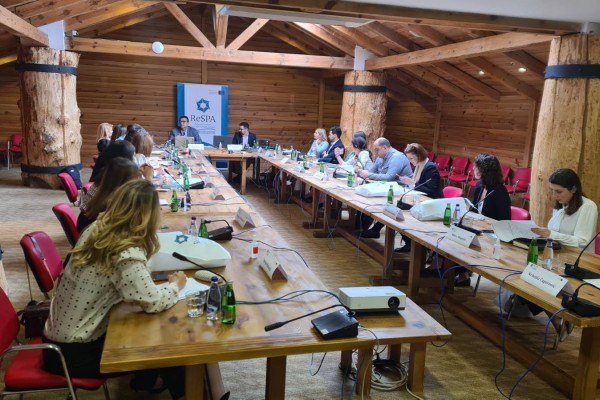
Analysis of Policy co-ordination processes in Montenegro
As the first face-to-face event in 2021, ReSPA organised the workshop on policy co-ordination processes in Montenegro. Following the analytical paper “Policy co-ordination in the Western Balkans” (which can be seen on ReSPA web site: https://www.respaweb.eu/download/doc/Analytical+paper+on+policy+coordination.pdf/98f87a923de5e72d1492d83a5d244df6.pdf ) ReSPA has organised work on specific national analytical documents which will enlighten the policy coordination processes and systems in each of Western Balkan administrations. The first drafted analysis is the National study on policy co-ordaintion processes in Montenegro, prepared by engaged expert Marko Savić. The Analysis contributes to a more efficient implementation of public administration reform in the region by strengthening policy co-ordination, especially those among PAR and PFM strategies.
The comprehensive discussion on the drafted analytical document was organised at the workshop with the participation of 20 pubic servants - representatives of the most relevant coordination structures: General Secretariat of the Government, NIPAC office, EU Accession Negotiation office, Ministry of Finance, Ministry of Foreign Affairs etc.
During the workshop, specifically, a fruitful discussion was organised on the following topics such as the development of the legislative and institutional framework for policy coordination in Montenegro, how international organizations see the state of play of policy coordination in Montenegro, coordination of PAR and PFM strategies, alignment between policy and budget planning.
Besides, the presentation of the national study Policy co-ordination, the Worskhop served as an excellent forum to discuss the proposed model of forming an additional mechanism for policy coordination and to identify further plans as well as potentials for progress in this area.
As Marko Savić explains, the constructive discussion showed the need to formalize the role of CoG institutions in the policy coordination process. The impression is that the departments share similar problems in the field of coordination, from communication and coordination within the departments to inter-ministerial cooperation. In addition, the impression is that civil servants at the operational level agree on ways to strengthen the coordination system, while additional efforts are needed to make awareness of the importance of regulating this system a priority among decision-makers.
This workshop was the first of several consecutive workshops, which will be organized in each of ReSPA Members, to present the strategic, legal, and institutional aspects of co-ordination of public policies (by focusing on the role of the most relevant public administration institutions in the improvement of co-ordination among public policies) as well as country-specific recommendations defined in national analytical papers devoted to policy coordination systems and mechanisms.



